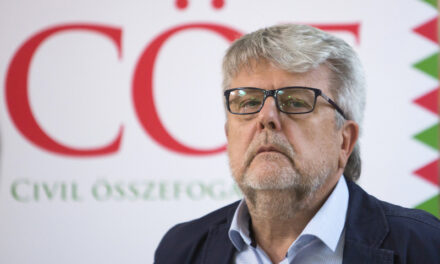Hungarian people and businesses have too much money, which should be taken away with harsh taxes - this is how the last presidential candidate of the left can be summed up briefly. Péter Róna spoke about a corporate tax increase and a multi-rate, brutally high 35 percent personal income tax at the top. Citing wartime inflation, he would sacrifice hundreds of thousands of domestic jobs, open up space for blackmail, cut salaries and, of course, drive away investors.
Those who watched ATV's interview with Péter Róna in the middle of the week could witness a creepy conversation. The most recent presidential candidate of the left - in his capacity as an economist - was asked by the host about what factors influence the numbers of the Hungarian economy.
Of course, Péter Róna scolded the government and the central bank, but he also started a specific explanation. According to the essence of this, inflation is high here because the central bank previously launched a preferential loan program for domestic small companies, and the government in February gave the elderly a 13-month pension, gun money for law enforcement officers, and reimbursed families a part of their personal income tax (PIT) paid last year. .
According to Róna, the virus is not a problem, nor is the international energy crisis, not to mention the Russian-Ukrainian war, or the retroactive Brussels sanctions, but only that
that Hungarian people and small businesses have too much money in their pockets. What is also spent.
Róna's proposed solution is also aligned with this starting point. According to him, the tax of all domestic companies should be raised to 15 percent instead of the current 9 percent - this is essentially the Brussels demand - and the personal income tax should be raised to the sky instead of the current 15 percent. Here it is worth quoting Péter Róna verbatim. "Progressive personal income tax must be introduced. I'm thinking at least three and maybe four steps here. At the level of three hundred thousand forints, it would be twenty percent, then twenty-five, thirty, and possibly thirty-five percent at the highest level." Since today the minimum wage is two hundred thousand forints and the average wage has exceeded half a million forints, Péter Róna would levy a 20 percent tax even on the lowest earnings, and the average wage might be taxed at an even higher rate.
Overall, Róna's text can actually be interpreted in only one way: people have too much money. Wartime inflation will cease if the state takes the money with brutal taxes.
By the way, governments in Hungary have already tried something similar.
They were led by Ferenc Gyurcsány and Gordon Bajnai between 2008 and 2010. The end was recession, impoverishment and 12 percent unemployment.
But it is no accident: Róna would not have been the candidate for president of the republic without Péter Gyurcsány. And it is no coincidence that Róna is now saying the same thing as the leader of the left, Ferenc Gyurcsány.
Source and full article: Origo
Featured image: MTI/Zoltán Máthé













